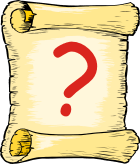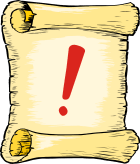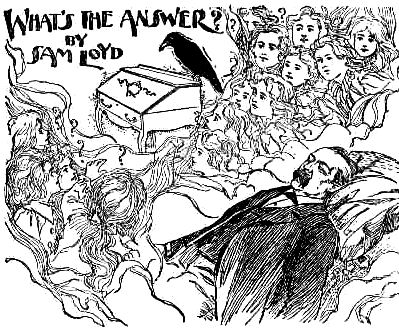



Sporty men are supposed to have unlimited nerve, and as a rule are seldom discouraged. Nevertheless, while returning from the Epsom races on the top of a bus, I encountered the worst case of hopeless discouragement I ever witnessed. A little fakir who had been running a side show game known as the new Monte Carlo was bemoaning his fate to the shell-game man. Business had been тАЬrather badly,тАЭ as he put it, but in the hope of retrieving his fortune he stood out in a soaking rain for a couple of hours. He was preparing to give up in despair when a party of jolly fellows came along, and one of them, too far gone in liquor to know what he was doing, placed ┬£10 on the 3, threw three of a kind, and cleaned him out of his last shilling!
The game is quite popular, and as no two persons can be found who give the same opinion regarding the chances of breaking this bank of Monte Carlo, I offer it as an elementary problem in the theory of chances. There are six squares marked 1, 2, 3, 4, 5 and 6, as shown in the sketch, and all are invited to place what money they wish on one or more of the numbers. Three dice are then thrown, and all who pick the numbers which turn up get their money back and as much more. If you place $1 on No. 5 and two 5s turn up you receive $1 stake and $2 more. If three 5s are turned you get $1 and $3. Now, then, how many of our clever mathematicians can tell what are the chances for or against the person who tries his luck?
The chances are 125 to 108 that you will lose, for if you select one number and then play all the chances 125 would lose and 81 would win. But as there are 15 throws which would win an extra $1 and one triple throw which would win an extra $2, the correct answer is that you would lose $125 to win $108. The part of winning $108, which is half of the possible 216 chances, has led writers on the subject into the error of saying that the chances are even. The error appears when you play on all six numbers, then you get your money back if three different numbers appear, but if three of a kind turn up you get back only $4 for an outlay of $6.
2.
What is that which you cannot hold ten minutes, although it is as light as a feather? Your breath.
What roof covers the most noisy tenant? The roof of the mouth.
Why does an orator resemble a pawnbroker? Because he lives by spouting.
What instrument of war does an angry lover resemble? A cross bow (beau).
Why is a horse smarter than a fox? Because a horse can run when he is in a trap and a fox can't.
3.

Probably every one of the millions upon millions of people who have enjoyed Lewis CarolтАЩs masterly and realistic description of the vagaries which flit through our minds while in dreamland have pondered over certain unanswered conundrums which were given by Alice in Wonderland.
While Alice, the Mad March Hare and the crazy Hatter were enjoying their tea, the hatter suggested some riddles, and asks, тАЬWhy is a writing desk like a raven?тАЭ
Alice said she believed she could guess it, but every time the question was revived it flitted from her mind, and faded away like that mysterious cat which left nothing more tangible than its everlasting smile. It is safe to assume, however, that, the famous Oxford mathematician and noted puzzlist had some clever answer up his sleeve, or he would not have propounded the conundrum.
The book itself is a riddle, and many persons, while reveling in its extravagant absurdities, have failed to recognize the faithful and wonderful description of a dream. It abounds in riddles and conundrums, like тАЬWhy was the turtle that kept school like a tortoise?тАЭ Because he tort us. What is more puzzling than that tangle of words when the countess deduces the moral: тАЬBe what you would seem to be, or never imagine yourself not to be otherwise than what it appears to others that you were or might have been, would have appeared to them to be otherwise.тАЭ
All of which is too apparent to require further digression from our subject:
Why is a writing desk like a raven?
I have never heard the answer, nevertheless, like the ancient query, тАЬWhy is a crow?тАЭ it has been asked so often that I am satisfied that our clever puzzlists will suggest a fitting answer.
Regarding the answer to the Crazy Hatter's conundrum as to тАЬwhy is a writing desk like a raven? тАЭ there is no absolute certainty of any answer having been intended, as Lewis Carroll never vouchsafed any replies to the curious problems pertaining to AliceтАЩs trip through Wonderland; nevertheless, my acquaintance with Carroll and his peculiar traits, convinced me that it was not altogether a haphazard query. My own guess, following the alliterative style which characterizes the entire work, would be тАЬthat the notes for which they are noted are not noted for being musical notesтАЭ; nevertheless, there is considerable scope for ingenuity and cleverness, as other answers, equally as good or better, might be suggested, like тАЬbecause Poe wrote on both,тАЭ тАЬHills and tales are among their characteristics,тАЭ тАЬBecause they stand on their legs,тАЭ тАЬBecause they conceal their steelsтАЭ or тАЬOught to be made to shut up,тАЭ etc., etc.
4. Concealed Geography
70. When in India Lord Raglan cast Eros, the blind dog, at his feet. Venus laughed.
71. The bride wore white, the bridesmaids blue. (An island.)
72. Trust no past, fear no future. (A river.)
73. Stocks, or rent, or what, make the best investment?
74. Did you ever read in Goldsmit of the curse of ambition?
75. The wounded are borne off the field on litters. (An island.)
76. Not money, but base love of money, harms.
77. тАЬA widowed bird sat, mourning for her mate, upon a wintry bough.тАЭ (River.)
78. Tall or short, fat or lean, shall make no difference here.
71, Hebrides; 72, Arno; 73, Sorrento; 74, Reading; 75, Borneo; 76, Basel; 77, Po; 78, Orleans.
[Page 114]